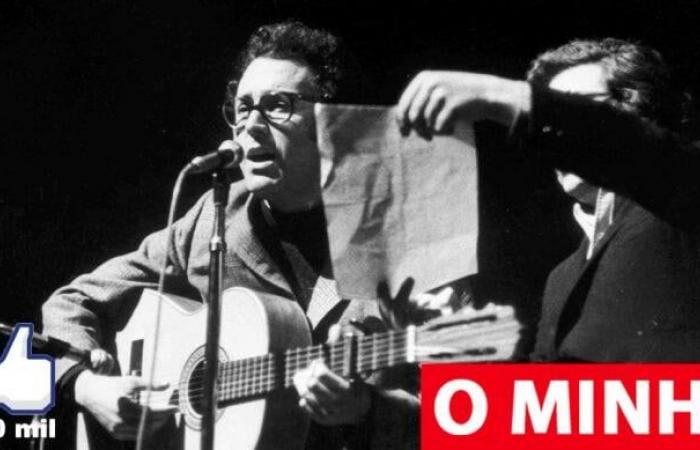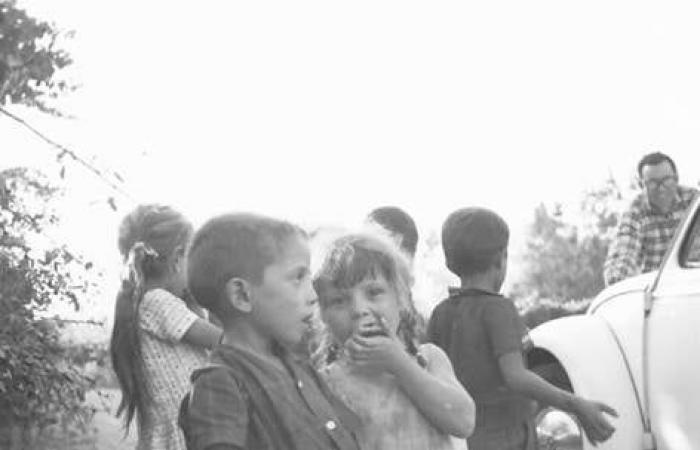Celebrating April is also remembering the protest songs. “Grândola Vila Morena” or Zeca Afonso are symbols of the important historical moment that took place in 1974 and which, half a century later, continue to be exalted. On the day that marks the 50th anniversary of the 25th of April, O MINHO tells the unknown story of a song by Zeca Afonso about a parish in Barcelos.
Came looking for Rosa RamalhoConcert in Paris was turbulent
It was on November 10, 1970 that the singer-songwriter presented, at a concert in Paris, the song “Ao Passar em Carapeços”.
The show, part of the “La Chanson de Combat Portugaise” initiative, began with the song “Na Rua António Maria” and followed by a new song that was never released on record. She played “Ao Passar em Carapeços”, a song that talks about the singer’s fleeting visit to the parish of Barcelona in 1968.
Thus, the most popular Portuguese intervention musician played at Maison de la Mutualité. important Parisian venue, a song that talked about Carapeços. He used an instrumental that was not original, it was adapted from the Alentejo popular song “Ao Passar na Ribeirinha”. However, the lyrics were inspired exactly by that parish of Barcelos. “When passing through Carapeços / Everything was outside the window (…) It seems like they’ve never seen / People from outside the land”, sang Zeca Afonso.
A car ride was enough for Zeca to get inspired and write some verses. “As in the past, as it still happens today in deep Portugal, when someone passes through a ‘lost’ village, the people of that village are curious to see those ‘foreigners’ who are passing through their land and then Zeca, upon noticing this (he had the ability to be a very good observer) to have written the lyrics of what he saw while passing through Carapeços”, explained Mário Lima, one of the most active promoters of the singer’s work, to O MINHO, in 2019.
Zeca Afonso chose to sing this song due to the large number of emigrants from Minho who were in Paris at the time, according to Mário Lima.
It is these explanations from the promoter that are enough to try to understand José Afonso’s motivation for writing a lyric about the parish of Barcelos and singing it in such an important concert. The song “Ao Passar em Carapeços” was never released on record, nor are there any more phonographic recordings recorded live.
The original recording is available on the website of the RTP archive, which has excerpts from the meeting “La Chanson de Combat Portugaise”, in the auditorium of the Maison de la Mutualité, which includes the musical moment starring Zeca. The song was also released on YouTube, on the channel of Mário Lima, a well-known blogger who brings together the artist’s work.
Came looking for Rosa Ramalho
He spent time in Carapeços in mid-August 1968, after having played at Clube Fluvial Vianense, on August 6th. He also played in Moledo, stayed in the Alto Minho region for another day to watch a popular show and then went down to Barcelos.
Zeca and his companions wanted to get to Galegos São Martinho to visit the workshop of Rosa Ramalho, a well-known lawyer from Barcelona. “The other day we went to Barcelos (how difficult it was to get there…) to Rosa Ramalho’s house”, said Rui Pato, guitarist who accompanied Zeca Afonso. The musician also mentioned, in a forum dedicated to the singer, that they bought “several pieces” from Rosa Ramalho.
The path to get to Galegos was difficult and they even asked some locals for help to show them the way. In the photographs that accompany this text, by Rui Pato, it is possible to see Zeca and Zélia Afonso, his wife, with the young people from Barcelona who showed the way to Rosa Ramalho’s house.
Concert in Paris was turbulent
The night of November 10, 1970 was not peaceful for Zeca Afonso. At the entrance to the auditorium of the Maison de la Mutualité, a mythical concert hall in Paris, leaflets were distributed attacking some of the singers who were going to perform that night, such as Sérgio Godinho, José Mário Branco, Luís Cília, Tino Flores and Zeca himself. Alfonso.
The night was dedicated to intervention music, as the title of the show indicated: “La Chanson de Combat Portugaise”.
“Go home, Zeca.” It was read on one of the pages of the bilingual pamphlet distributed by a group of far-left activists, made up of PCP dissidents. They accused the Portuguese singer of colluding with the dictatorial regime, as he was not in exile and continued to release records in Portugal despite censorship.
This small group was present at the concert and greatly disrupted the night, contributing to an atmosphere of great tension. The musical moments ended up being interrupted several times, there were physical confrontations between the audience and one of the most contested by this faction was Zeca. He interrupted the concert amidst the jeers and was unable to contain himself in the face of serious accusations of colluding with the regime. “I am willing to provide more direct instructions to those who expect singers to bring about the revolution, while they are perhaps sitting in Café Luxemburgo”, Zeca threw from the stage to the “three or four” members of the group who destabilized the entire night.
It was a night of bad memory for Zeca Afonso, as he himself told José A. Salvador, in the biography “Livra-te do Medo”. “I remember that once, in Paris, I was completely ridiculed by a small group (…) They distributed some bilingual leaflets that started like this: ‘Cry, comrade, Cry’. Such individuals did not even know how to analyze music, much less texts. Most of my songs were of popular origin, “Lá vai Jeremias” and many others. The guys thought I was a whiner like all bourgeois singers”, recalled José Afonso, in the book published in 2014.







